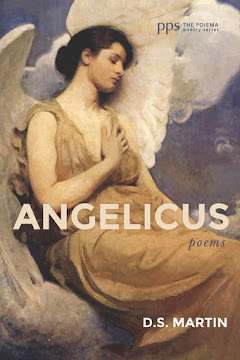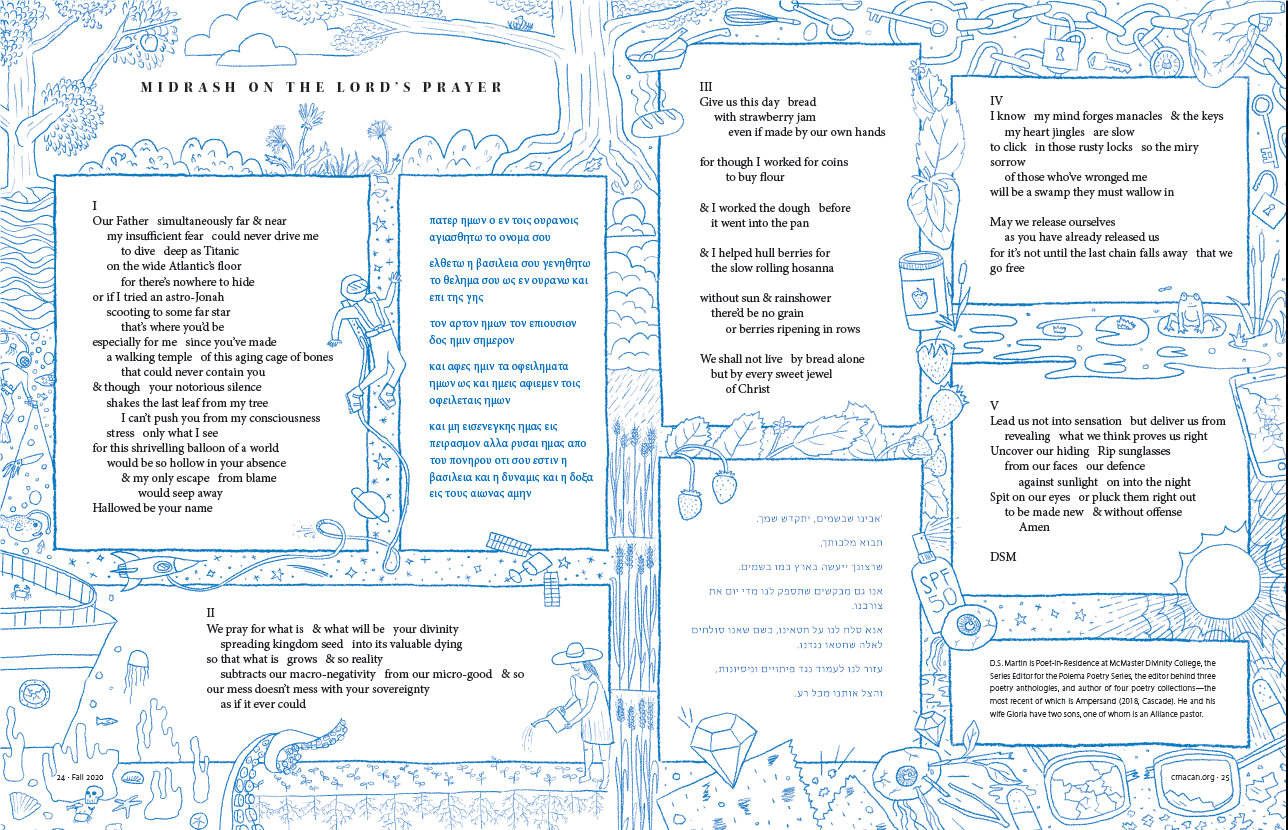Peter Cooley is Professor of English Emeritus at Tulane University, in New Orleans, and is former Poet Laureate of Louisiana. He serves as poetry editor for Christianity and Literature.
His eleven poetry books include: The Company of Strangers (1975), Sacred Conversations (1998), Divine Margins (2009), and his most-recent poetry collection The One Certain Thing. (2021, Carnegie Mellon University Press). This book of elegies, written in the wake of the sudden death of his wife of fifty years, has been described as a “three-part conversation between the speaker, his wife, and God.”
The following ekphrastic poem first appeared in The Christian Century. This link provides an image of the Fra Angelico painting that inspired the poem.
Fra Angelico, The Annunciation, 1437–1446
Light from my chosen star will come to me
in morning prayer, but only if I beg,
desperate like the unfortunate I met
yesterday morning, New Orleans 8 a.m.
corner Claiborne and Carrollton.
He lifted both palms up, that’s how I pray
we’re brotherbodies Fate estranged—
I’m sure the stars pray in dazzling choirs
or singly, hands clasped to their chests
like Fra’s angel, kneeling, left knee bent,
facing Mary, supernal light gracing the porticos.
This visit that might have changed the world.
If only I could transcribe the painting’s beautifuls!
But here I am, exhausted as if I’d spent the night
sleeping in the park the way he has to,
ashamed of the comparison but praying this
on one knee beside my bed, asking myself,
asking the morning star and you and You,
why did I drive by, not giving him a dime?
How dare I try to compare myself, twice,
to the angel, to him, both, I’m twice-ashamed.
And, say it, afraid, twice-afraid to write this.
Posted with permission of the poet.
Entry written by D.S. Martin. He is the author of five poetry collections including Angelicus (2021, Cascade) ― a book of poems written from the point-of-view of angels. His books are available through Wipf & Stock.
Monday, November 28, 2022
Monday, November 21, 2022
Richard Jones*
Richard Jones is an accomplished poet, who has been the editor of the journal Poetry East ever since he founded it in 1980. He has taught at DePaul University in Chicago since 1987, and is the author of more than a dozen books of poetry, including The Blessing: New & Selected Poems (2000, Copper Canyon).
His latest collection is Stranger on Earth (2018, Copper Canyon). Andrew Jarvis wrote in the New York Journal of Books that most of these prose poems are “…derived from memories, and Jones utilizes his memories of family, history, and culture to craft poems full of clear images and rich detail…” He says the “concept of beauty, and all things beautiful, is explored in the majority of these poems…” and points out that Marcel Proust’s philosophy ― “Life of every day is supremely important” ― is central to the book.
Back in 2007 when a number of artists (including poets B.H. Fairchild and Sydney Lea) were asked by Image to express why they believe in God, Richard Jones responded straight-forwardly,
----------“I believe in God because the poetry of the scriptures
----------revealed him to me. By God’s grace I opened the Bible
----------and discovered his near and palpable presence. Now, when
----------I read, illuminated by the Spirit, I give thanks as I find
----------myself abandoning my own limited understanding to seek
----------his perfect will…”
The Manifestation
The night of the Perseid shower,
thick fog descended
but I would not be denied.
I had put the children to bed,
knelt with them,
and later
in the quiet kitchen
as tall red candles
burned on the table between us,
I’d listened to my wife’s sweet imprecations,
her entreaties to see a physician.
But at the peak hour—
after she had gone to bed,
and neighboring houses
stood solemn and dark—
I felt no human obligation
and went without hope into the yard.
In the white mist
beneath the soaked and dripping trees,
I lifted my eyes
into a blind nothingness of sky
and shivered in a white robe.
I couldn’t see the outline
of the neighbor’s willows,
much less the host of streaking meteorites
no bigger than grains of sand
blazing across the sky.
I questioned the mind, my troubled thinking,
and chided myself to go in,
but looking up,
I thought of the earth
on which I stood,
my own
scanty plot of ground,
and as the lights passed unseen
I imagined glory beyond all measure.
Then I turned to the lights in the windows—
the children’s nightlights,
and my wife’s reading lamp, still burning.
Posted with permission of the poet.
*This is the second Kingdom Poets post about Richard Jones: first post.
Entry written by D.S. Martin. He is the author of five poetry collections including Angelicus (2021, Cascade) ― a book of poems written from the point-of-view of angels. His books are available through Wipf & Stock.
His latest collection is Stranger on Earth (2018, Copper Canyon). Andrew Jarvis wrote in the New York Journal of Books that most of these prose poems are “…derived from memories, and Jones utilizes his memories of family, history, and culture to craft poems full of clear images and rich detail…” He says the “concept of beauty, and all things beautiful, is explored in the majority of these poems…” and points out that Marcel Proust’s philosophy ― “Life of every day is supremely important” ― is central to the book.
Back in 2007 when a number of artists (including poets B.H. Fairchild and Sydney Lea) were asked by Image to express why they believe in God, Richard Jones responded straight-forwardly,
----------“I believe in God because the poetry of the scriptures
----------revealed him to me. By God’s grace I opened the Bible
----------and discovered his near and palpable presence. Now, when
----------I read, illuminated by the Spirit, I give thanks as I find
----------myself abandoning my own limited understanding to seek
----------his perfect will…”
The Manifestation
The night of the Perseid shower,
thick fog descended
but I would not be denied.
I had put the children to bed,
knelt with them,
and later
in the quiet kitchen
as tall red candles
burned on the table between us,
I’d listened to my wife’s sweet imprecations,
her entreaties to see a physician.
But at the peak hour—
after she had gone to bed,
and neighboring houses
stood solemn and dark—
I felt no human obligation
and went without hope into the yard.
In the white mist
beneath the soaked and dripping trees,
I lifted my eyes
into a blind nothingness of sky
and shivered in a white robe.
I couldn’t see the outline
of the neighbor’s willows,
much less the host of streaking meteorites
no bigger than grains of sand
blazing across the sky.
I questioned the mind, my troubled thinking,
and chided myself to go in,
but looking up,
I thought of the earth
on which I stood,
my own
scanty plot of ground,
and as the lights passed unseen
I imagined glory beyond all measure.
Then I turned to the lights in the windows—
the children’s nightlights,
and my wife’s reading lamp, still burning.
Posted with permission of the poet.
*This is the second Kingdom Poets post about Richard Jones: first post.
Entry written by D.S. Martin. He is the author of five poetry collections including Angelicus (2021, Cascade) ― a book of poems written from the point-of-view of angels. His books are available through Wipf & Stock.
Monday, November 14, 2022
Robert B. Shaw
Robert B. Shaw is the author of What Remains to Be Said: New and Selected Poems (2022, Pinyon) which includes verse from his seven earlier collections. He is Professor Emeritus of English at Mount Holyoke College in Massachusetts, and has taught at both Harvard and Yale. The two poetry-related nonfiction books he has written ― The Call of God: The Theme of Vocation in the Poetry of Donne and Herbert (1981), and Blank Verse: A Guide to Its History and Use (2007) ― parallel Shaw’s poetic work.
When interviewed by Ryan Wilson for Literary Matters he said, “I haven’t very often made religious sentiments paramount in my work, but because they have shaped my view of existence, they are there to be found in more than a few poems. I think that in certain pieces my view of nature can broadly be termed sacramental. I may not have intended that in every case when I sat down to write, but it is what emerged.”
The last of the “new” poems in What Remains to Be Said concludes with the following hope concerning his poems:
----------"Let them give homage to the Word
----------"by whom the leaves of life are stirred.
----------"What I write now, let them say then.
----------"And let the last word be Amen.
The following poem first appeared in The Hudson Review, subsequently in The Best American Poetry 1998, in his 1999 collection Below The Surface, this year in the new anthology Christian Poetry in America Since 1940, and in his new volume What Remains to Be Said.
A Geode
What started out a glob of molten mud
hawked up by some Brazilian volcano
back in the Pleistocene is now a rock
of unremarkable appearance, brown
as ordinary mud and baseball-size.
Picking it up produces a surprise:
besides a pleasant heftiness, a sound
of sloshing can be noticed. Vapors caught
within its cooling crust were liquified,
and linger still: a million-year-old vintage.
Although one might recall the once ubiquitous
snowstorm-in-a-glass-globe paperweights,
this offers us no view inside to gauge
the wild weather a shake or two incites.
Turbulence masked by hard opacity . . .
If we could, which would we rather see?—
age-old distillate, infant tears of the earth,
or gem-like crystal of the inner walls
harboring them like some fair reliquary?
To see the one we'd have to spill the other.
Better to keep it homely and intact,
a witness to the worth of hiddenness,
which, in regard to our own kind, we call
reticence, and in terms of higher things,
mystery. Let the elixir drench unseen
the facets that enshrine it, world without end.
Entry written by D.S. Martin. He is the author of five poetry collections including Angelicus (2021, Cascade) ― a book of poems written from the point-of-view of angels. His books are available through Wipf & Stock.
When interviewed by Ryan Wilson for Literary Matters he said, “I haven’t very often made religious sentiments paramount in my work, but because they have shaped my view of existence, they are there to be found in more than a few poems. I think that in certain pieces my view of nature can broadly be termed sacramental. I may not have intended that in every case when I sat down to write, but it is what emerged.”
The last of the “new” poems in What Remains to Be Said concludes with the following hope concerning his poems:
----------"Let them give homage to the Word
----------"by whom the leaves of life are stirred.
----------"What I write now, let them say then.
----------"And let the last word be Amen.
The following poem first appeared in The Hudson Review, subsequently in The Best American Poetry 1998, in his 1999 collection Below The Surface, this year in the new anthology Christian Poetry in America Since 1940, and in his new volume What Remains to Be Said.
A Geode
What started out a glob of molten mud
hawked up by some Brazilian volcano
back in the Pleistocene is now a rock
of unremarkable appearance, brown
as ordinary mud and baseball-size.
Picking it up produces a surprise:
besides a pleasant heftiness, a sound
of sloshing can be noticed. Vapors caught
within its cooling crust were liquified,
and linger still: a million-year-old vintage.
Although one might recall the once ubiquitous
snowstorm-in-a-glass-globe paperweights,
this offers us no view inside to gauge
the wild weather a shake or two incites.
Turbulence masked by hard opacity . . .
If we could, which would we rather see?—
age-old distillate, infant tears of the earth,
or gem-like crystal of the inner walls
harboring them like some fair reliquary?
To see the one we'd have to spill the other.
Better to keep it homely and intact,
a witness to the worth of hiddenness,
which, in regard to our own kind, we call
reticence, and in terms of higher things,
mystery. Let the elixir drench unseen
the facets that enshrine it, world without end.
Entry written by D.S. Martin. He is the author of five poetry collections including Angelicus (2021, Cascade) ― a book of poems written from the point-of-view of angels. His books are available through Wipf & Stock.
Monday, November 7, 2022
Ruth Pitter*
Ruth Pitter (1897—1992) is a British poet who published eighteen collections, and received many honours, including the Queen's Gold Medal for Poetry in 1955. In 1974 she became one of the twelve living writers honoured with the title Companion of Literature by the Royal Society of Literature.
She did not embrace poetic modernism — so popular in her day — and because of this has been largely overlooked in ours. Fellow formalist poet Philip Larkin included four of her poems in The Oxford Book of Twentieth Century English Verse (1973) — and she has been lauded by several poets and critics. Elizabeth Jennings said in the introduction to Ruth Pitter’s Collected Poems (1996, Enitharmon) that her poetry shows “an acute sensibility and deep integrity.”
Since the wrestling between critics for influence continues, only time will tell whether Ruth Pitter will gain new popularity, or slip into obscurity. Kathleen Raine has expressed she believes Pitter’s poetry “will survive as long as the English language, with whose expressiveness in image and idea she has kept faith, remains.”
The following poem is from Pitter’s book A Trophy of Arms (1936) and is the title poem in a new critical edition of her collected poems, edited by Don W. King (2018, Kent State University Press).
Sudden Heaven
All was as it had ever been—
The worn familiar book,
The oak beyond the hawthorn seen,
The misty woodland’s look:
The starling perched upon the tree
With his long tress of straw—
When suddenly heaven blazed on me,
And suddenly I saw:
Saw all as it would ever be,
In bliss too great to tell;
For ever safe, for ever free,
All bright with miracle:
Saw as in heaven the thorn arrayed,
The tree beside the door;
And I must die—but O my shade
Shall dwell there evermore.
*This is the second Kingdom Poets post about Ruth Pitter: first post.
Entry written by D.S. Martin. He is the author of five poetry collections including Angelicus (2021, Cascade) ― a book of poems written from the point-of-view of angels. His books are available through Wipf & Stock.
She did not embrace poetic modernism — so popular in her day — and because of this has been largely overlooked in ours. Fellow formalist poet Philip Larkin included four of her poems in The Oxford Book of Twentieth Century English Verse (1973) — and she has been lauded by several poets and critics. Elizabeth Jennings said in the introduction to Ruth Pitter’s Collected Poems (1996, Enitharmon) that her poetry shows “an acute sensibility and deep integrity.”
Since the wrestling between critics for influence continues, only time will tell whether Ruth Pitter will gain new popularity, or slip into obscurity. Kathleen Raine has expressed she believes Pitter’s poetry “will survive as long as the English language, with whose expressiveness in image and idea she has kept faith, remains.”
The following poem is from Pitter’s book A Trophy of Arms (1936) and is the title poem in a new critical edition of her collected poems, edited by Don W. King (2018, Kent State University Press).
Sudden Heaven
All was as it had ever been—
The worn familiar book,
The oak beyond the hawthorn seen,
The misty woodland’s look:
The starling perched upon the tree
With his long tress of straw—
When suddenly heaven blazed on me,
And suddenly I saw:
Saw all as it would ever be,
In bliss too great to tell;
For ever safe, for ever free,
All bright with miracle:
Saw as in heaven the thorn arrayed,
The tree beside the door;
And I must die—but O my shade
Shall dwell there evermore.
*This is the second Kingdom Poets post about Ruth Pitter: first post.
Entry written by D.S. Martin. He is the author of five poetry collections including Angelicus (2021, Cascade) ― a book of poems written from the point-of-view of angels. His books are available through Wipf & Stock.
Subscribe to:
Posts (Atom)






















